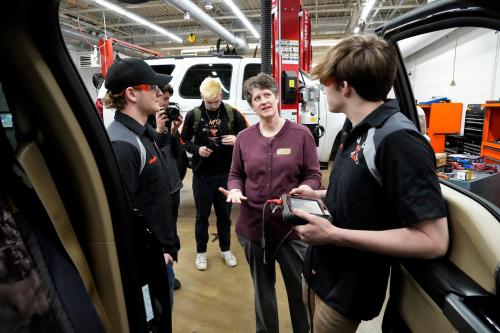On April 26, the Brown Center on Education Policy hosted the seventh annual A. Alfred Taubman Forum on Public Policy. During the forum, education experts and practitioners from various perspectives explored the role, effectiveness, and future of charter schools in the U.S. education system. They discussed how these schools were created as a way to bring innovation to the classroom and as a new way to create new type of public schools. Have charter schools lived up to this mission and if not, why not?
Penetration of charter schools in the U.S. education system
The first charter school law was enacted 25 years ago in Minnesota in 1991, and since then charters have become integrated into public school offerings across the country. Currently, they serve roughly 6.5 percent of American students (over 2.5 million students) in 43 states plus the District of Columbia. However, their distribution is not spread uniformly across states and communities. Some states, including Louisiana and Arizona, have the highest percentage of students enrolled in charters (10 percent), while several rural states do not have charter laws. Likewise, these schools serve more students in urban areas rather than in nonurban areas. While in large cities 15 percent of public school students are enrolled in a charter school, only two percent are enrolled in rural areas. Further charters show higher effects on test scores in urban areas.
The growth of charter schools has been gradual and linear with an increase between one and two percentage points year after year. Panelist Jon Valant, a postdoctoral fellow in the Education Research Alliance of New Orleans and Tulane University’s Department of Economics, speculated that charters have not reached an equilibrium point and that there is room for their continued growth due to elimination of charter enrollment caps by programs like Race to the Top and their positive popular opinion (2/3 support charters while about 2/3 opposed vouchers in recent polls).
How the charter movement is unlike any other
Panelists discussed what makes the charter school movement unique unto itself. Charter schools have raised expectations for low income students, according to Howard L. Fuller, Distinguished Professor of Education and Director of the Institute for the Transformation of Learning at Marquette University. Fuller says charters have “put to bed the lie that you can’t educate kids who are poor.” Charters have demonstrated that it is possible for disadvantaged populations to reach academic excellence, though there is still the need to empower minorities and people of color to run these schools and to define the role of these schools in the communities they serve. “The charter school movement is the only movement I’m aware of where the people being impacted by it aren’t leading it,” Fuller also added.
By the numbers: How effective are charter schools?
Another important issue discussed was research about the effectiveness of charters schools. Panelist Doug Harris, Professor of Economics and Schleider Foundation Chair in Public Education at Tulane University said many people commonly ask whether charter schools are “working,” but responds that it’s not a simple answer. Rather, the research shows a nuanced relationship between charter schools, the communities they serve, and governance. Harris highlighted five scenarios in which charter schools tend to perform better:
- When they serve urban, low-income, and low-performing students.
- When there is a supply of high-quality teachers.
- In cities with more intense accountability and oversight.
- When there is a “no excuses model” (more time on task, more strict structure, discipline, tutoring).
- When the environment is on campus and not online.
While charter schools have shown higher returns in New Orleans, it is important to be cautious because these results were driven by particular characteristics that the city faced after Hurricane Katrina and may not see in other states. For instance, just an hour north in Baton Rouge, charter schools have been trying to operate under the Recovery School District (the same entity that has overseen charter schools in New Orleans) but have struggled getting teachers and educators to get there and have had a very different record.
Thus far, the research has primarily been focused on the “horse race” and education politics, on how students in the charter sector compare with those in traditional public schools; however, panelists generally agreed the research needs to evolve into what can be learned from charter schools to apply to traditional schools.
Reflections on past and future of charters from Secretary Arne Duncan
The forum concluded with a session in which former U.S. Secretary of Education Arne Duncan discussed the importance of educators and policymakers having the common goal of academic success. He agrees that charter movement has made great strides but that we should be agnostic about the charter schools brand because it is not the only model of quality education. According to Duncan, charters have improved student outcomes by spending more time with students through longer days and a longer academic year, by their focus on retaining great teachers and principals, by providing personalized instruction, and with their optimistic approach to what children can do; these practices can and should be adopted in charters and traditional district-run schools alike.
Reflecting on his experience as Secretary of Education, Duncan stated that education should be the “ultimate nonpartisan, nonpolitical issue.” He mentioned the need for leaders to unite around some common goals: access to high quality pre-K, get high school graduation rates to 100 percent as fast as possible, and increase college completion rates. Finally, he emphasized the importance of courage and the sense of urgency necessary to close the opportunity gap.
Missed our charter schools forum on April 26, 2016 or want to learn more? See the A. Alfred Taubman Forum on Public Policy event page for a full video recap.



Commentary
A. Alfred Taubman Forum on Public Policy examines 25 years of charter schools in America
May 2, 2016